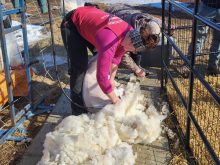Horse owners who bought freshly weaned foals this fall can ease their transition by offering comfortable surroundings, says a livestock specialist.
“Whatever you can do to make it easier is all helpful,” said Jim Graham from Saskatchewan Agriculture.
There are approximately 475,000 horses across Manitoba, Saskatchewan and Alberta. Graham said many foals are sold in the fall and head to a new home. The process can be stressful.
“Well, they’ve been taken away from their mom, new surroundings, not used to the water bowl and may not be very used to people,” Graham said.
Read Also

Charges laid after cattle theft
Saskatchewan RCMP lay two charges against a man after six cattle went missing.
“A horse’s natural instinct is fright. So if they haven’t been handled very much, they need to get used to you.”
Foals sold at auction are often freshly weaned. Graham said the first hurdle for horse owners is to get the foals to eat feed and drink water.
“I think the biggest thing is that they need to have some really good quality hay and probably start them off on oats or a prepared ration.”
Sixty-five percent of a horse’s growth occurs in the first year so nutritious feed is necessary. He said foals eat about three percent of their body weight daily. For example, a 400 pound foal will eat about 12 lb. of hay and grain per day, and it should be divided into several feedings.
Graham suggested an alfalfa-brome mix, a prepared supplement, minerals and vitamins as part of a foal’s diet. An abundant supply of fresh, clean water is also needed.
“Colts, when they’re on their mother, they drink a lot. Not a lot at a time, but they drink often,” Graham said.
Foals tend to pace when under stress, meaning calories are burnt. Graham said foals walk several kilometres in the first three days of adjustment.
Owners should place feed and water at various spots around the pen to give the foals several opportunities to feed.
“So they’ll pick up a mouthful here and a mouthful there.”
Mae Smith, executive director of the Saskatchewan Horse Federation, said new owners should consult with a veterinarian when buying foals.
“I think they really need to be aware of the developmental stages of the foal and the needs, you know, at each level, what they’re going to be looking for,” said Smith.
“Just adjusting to the new situation is very difficult for a horse, so I think you want to offer security to the animal and make them feel safe.”
Graham added that competition could occur if owners have more than one foal in a pen.
“There will be a pecking order,” he said. “So, there will be some rough-housing and fighting going on, but once they get that sorted out, then you’ll (the owner) be OK.”
As winter approaches, Graham recommended foals be dewormed to avoid foals losing feed energy and nutrition to the parasites.
















